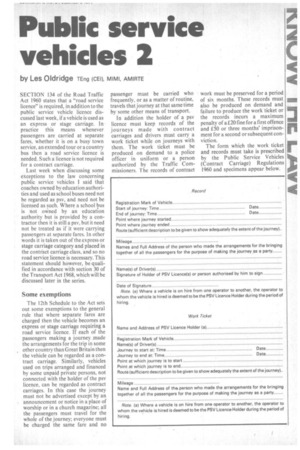Public service vehicles 2
Page 83

If you've noticed an error in this article please click here to report it so we can fix it.
by Les Oldridge TEng (CEO, MIMI, AMIRTE SECTION 134 of the Road Traffic Act 1960 states that a "road service licence" is required, in addition to the public service vehicle licence discussed last week, if a vehicle is used as an express or stage carriage. In practice this means whenever passengers are carried at separate fares, whether it is on a busy town service, an extended tour or a country bus then a road service licence is needed. Such a licence is not required for a contract carriage.
Last week when discussing some exceptions to the law concerning public service vehicles I said that coaches owned by education authorities and used as school buses need not be regarded as psv, and need not be licensed as such. Where a school bus is not owned by an education authority but is provided by a contractor then it is still a psv, but it need not be treated as if it were carrying passengers at separate fares. In other words it is taken out of the express or stage carriage category and placed in the contract carriage class, and so no road service licence is necessary. This statement should however, be qualified in accordance with section 30 of the Transport Act 1968, which will be discussed later in the series.
Some exemptions
The 12th Schedule to the Act sets out some exemptions to the general rule that where separate fares are charged then the vehicle becomes an express or stage carriage requiring a road service licence. If each of the passengers making a journey made the arrangements for the trip in some other country than Great Britain then the vehicle can be regarded as a contract carriage. Similarly, vehicles used on trips arranged and financed by some unpaid private persons, not connected with the holder of the psv licence, can be regarded as contract carriages. In this case the journey must not be advertised except by an announcement or notice in a place of worship or in a church magazine; all the passengers must travel for the whole of the journey; everyone must be charged the same fare and no passenger must be carried who frequently, or as a matter of routine, travels that journey at that same time by some other means of transport.
In addition the holder of a psv licence must keep records of the journeys made with contract carriages and drivers must carry a work ticket while on journeys with them. The work ticket must be produced on demand to a police officer in uniform or a person authorized by the Traffic Commissioners. The records of contract work must be preserved for a period of six months. These records must also be produced on demand and failure to produce the work ticket or the records incurs a maximum penalty of a £20 fine for a first offence and £50 or three months' imprisonment for a second or subsequent conviction.
The form which the work ticket and records must take is prescribed by the Public Service Vehicles (Contract Carriage) Regulations 1960 and specimens appear below.












































































































































